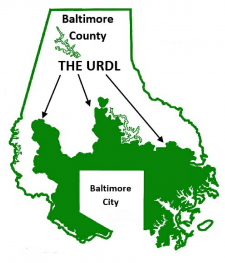
FOR IMMEDIATE RELEASE
August 7, 2019
Contact:
Barbara Hopkins
443-377-3760
barbara@neighborspacebaltimorecounty.org
Baltimore County Council Bill 37-19 Would Remove Loopholes in Adequate Public Facilities Law Governing Open Space
NeighborSpace estimates well over $1 million “left on the table” since July 2016
Towson, MD – Today, NeighborSpace of Baltimore County applauded Councilmen Tom Quirk and David Marks for their leadership in introducing Bill 37-19, which seeks to close loopholes in the county’s Adequate Public Facilities law. These loopholes have significantly reduced the amount of open space delivered and waiver fees paid by development projects over many years, by providing credits for private, on-site amenities, like pools and pickle ball courts, parking islands, and other strips of unbuilt land that are unsuitable for public, recreational use.
Based on a review of public records dating to July 2016, NeighborSpace estimates that the parking islands loophole alone has reduced the open space waiver fees payable to the County by over $1 million, more than the County collected in open space waiver fees in fiscal years 2017 and 2018 combined. The same projects, while generating a need under current law (1,000 SF of open space per dwelling) for 1,393,000 SF or 32 acres of open space, provided only 3.6% of that amount or 50,572 SF.
If approved, Bill 37-19 will amend Section 32-6-108 of the County’s Adequate Public Facilities law, which defines and sets minimum requirements for the provision of open space in new or re-developments within certain defined development tiers. In addition to removing the parking island loophole, the bill eliminates a provision that currently allows developers to deduct 60% of the cost of private outdoor amenities, such as rooftop pools and pickle ball courts, from the open space waiver fees owed to the County.
“The current practice of allowing massive deductions for things that do nothing to address the pressing open space deficit negates and weakens the ability of NeighborSpace and the County Department of Recreation and Parks to provide sufficient open space in the older communities of Baltimore County and in the areas that see the brunt of new development. There are simply not enough resources to protect, improve, and maintain land for much-needed parks, trails, gardens, and natural areas,” said NeighborSpace Board Chair Klaus Philipsen in response to the bill’s introduction. While 20 percent of the fees collected under this section of the Adequate Public Facilities law go to NeighborSpace, 80 percent go to the County Department of Recreation and Parks for the creation and enhancement of larger parks and trails for County residents.
“A failure to eliminate the loopholes is tantamount to kicking the can further down the road, losing critical funding for parks, trails and natural areas that promote the health and well-being of our residents and making an already untenable situation that much worse,” noted Philipsen. According to a rigorous analysis that NeighborSpace conducted in conjunction with the National Park Service, an astonishing 65 percent of residences inside the URDL currently lack access to adequate open space within a five-minute walk.
“Policymaking in Baltimore County must evolve to address current health, equity, and sustainability needs. As our population continues to grow, land use policies must give the health of Baltimore County residents and quality of life in our older communities highest priority. This is the only way to protect home values, ensure that these neighborhoods remain attractive places to live, and maintain a strong tax base,” said Philipsen.
 NeighborSpace of Baltimore County is a qualified, nonprofit land trust that works to enhance the livability of communities inside Baltimore County’s Urban Rural Demarcation Line (URDL) by protecting and improving land for small parks, gardens, trails and natural areas. Like most land trusts around the country, NeighborSpace plays a role that complements the work of local government, using its unique nonprofit status and the assistance of community partners to forever protect lands with significant conservation value, such as the ability to provide much-needed public open space. Since its founding in 2002, the organization has protected 100 acres of land across 20 sites inside the Urban Rural Demarcation Line (URDL) in the County. For more information about NeighborSpace’s mission and work, visit www.neighborspacebaltimorecounty.org.
NeighborSpace of Baltimore County is a qualified, nonprofit land trust that works to enhance the livability of communities inside Baltimore County’s Urban Rural Demarcation Line (URDL) by protecting and improving land for small parks, gardens, trails and natural areas. Like most land trusts around the country, NeighborSpace plays a role that complements the work of local government, using its unique nonprofit status and the assistance of community partners to forever protect lands with significant conservation value, such as the ability to provide much-needed public open space. Since its founding in 2002, the organization has protected 100 acres of land across 20 sites inside the Urban Rural Demarcation Line (URDL) in the County. For more information about NeighborSpace’s mission and work, visit www.neighborspacebaltimorecounty.org.